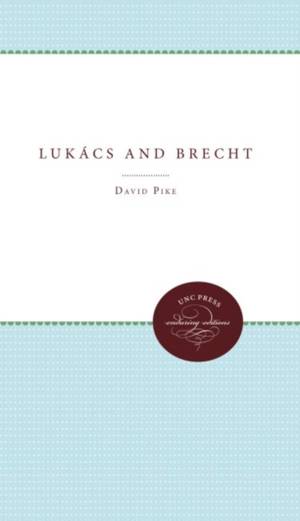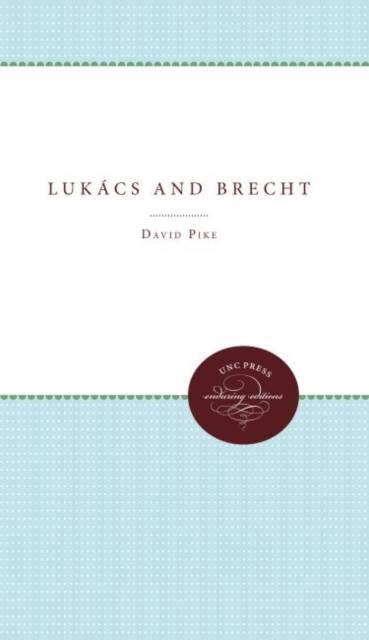
- Retrait gratuit dans votre magasin Club
- 7.000.000 titres dans notre catalogue
- Payer en toute sécurité
- Toujours un magasin près de chez vous
- Retrait gratuit dans votre magasin Club
- 7.000.0000 titres dans notre catalogue
- Payer en toute sécurité
- Toujours un magasin près de chez vous
Description
David Pike traces the evolution of interrelated political and literary theoretical currents in the Soviet Union from the early 1930s to the late 1940s and places the writings of Georg Lukacs and Bertolt Brecht within that context. Lukacs' ideas are examined in order to define the derivative nature of his political stance and to ascertain its influence upon the formation of his aesthetic. Pike then explores the cause of Brecht's clash with German and Soviet Stalinists over their decreed aesthetic principles before dealing with his political outlook and its correspondence with standard Soviet assumptions.
The link between the two men lies in their practice of viewing reality through the prism of a rigid political dogma. This persistent inclination led to theorietical rationalizations that were incapable of acknowledging the evolving pattern of Stalinist atrocities or that classified these atrocities as historical necessity, and it likewise distorted each man's view of fascism.
An additional dimension to this fascination with an exclusive political dogma is that Brecht's tendency to indulge in the Stalinist mystique was not tempered in the least by his Western European or American experience. In fact, his perceptions of Western democracy only drove him further away from any acceptance or appreciation of traditional democratic values. Lukacs, by contrast, chose Soviet exile. There he had little chance to pursue insights into political or aesthetic theory which were meaningfully independent of the dogmas emerging around him. Ironically, Lukacs drifted so far in the opposite direction that he helped work out doctrinal ideas characteristic of fully developed Stalinism.
Pike examines another set of parallels and divergences in the realm of aesthetic theory. Whereas Lukacs literary ideas were never incompatible with the political dogma of Stalinism, the political orthodoxy that Brecht shared with Lukacs contributed to an entirely different aesthetic theory and literary practice, one differing radically from Lukacs' views and from the socialist realism of the Soviet cultural establishment.
Originally published in 1985.
A UNC Press Enduring Edition -- UNC Press Enduring Editions use the latest in digital technology to make available again books from our distinguished backlist that were previously out of print. These editions are published unaltered from the original, and are presented in affordable paperback formats, bringing readers both historical and cultural value.
The link between the two men lies in their practice of viewing reality through the prism of a rigid political dogma. This persistent inclination led to theorietical rationalizations that were incapable of acknowledging the evolving pattern of Stalinist atrocities or that classified these atrocities as historical necessity, and it likewise distorted each man's view of fascism.
An additional dimension to this fascination with an exclusive political dogma is that Brecht's tendency to indulge in the Stalinist mystique was not tempered in the least by his Western European or American experience. In fact, his perceptions of Western democracy only drove him further away from any acceptance or appreciation of traditional democratic values. Lukacs, by contrast, chose Soviet exile. There he had little chance to pursue insights into political or aesthetic theory which were meaningfully independent of the dogmas emerging around him. Ironically, Lukacs drifted so far in the opposite direction that he helped work out doctrinal ideas characteristic of fully developed Stalinism.
Pike examines another set of parallels and divergences in the realm of aesthetic theory. Whereas Lukacs literary ideas were never incompatible with the political dogma of Stalinism, the political orthodoxy that Brecht shared with Lukacs contributed to an entirely different aesthetic theory and literary practice, one differing radically from Lukacs' views and from the socialist realism of the Soviet cultural establishment.
Originally published in 1985.
A UNC Press Enduring Edition -- UNC Press Enduring Editions use the latest in digital technology to make available again books from our distinguished backlist that were previously out of print. These editions are published unaltered from the original, and are presented in affordable paperback formats, bringing readers both historical and cultural value.
Spécifications
Parties prenantes
- Auteur(s) :
- Editeur:
Contenu
- Nombre de pages :
- 360
- Langue:
- Anglais
Caractéristiques
- EAN:
- 9780807865811
- Date de parution :
- 27-01-11
- Format:
- Livre broché
- Format numérique:
- Trade paperback (VS)
- Dimensions :
- 152 mm x 229 mm
- Poids :
- 526 g

Les avis
Nous publions uniquement les avis qui respectent les conditions requises. Consultez nos conditions pour les avis.






